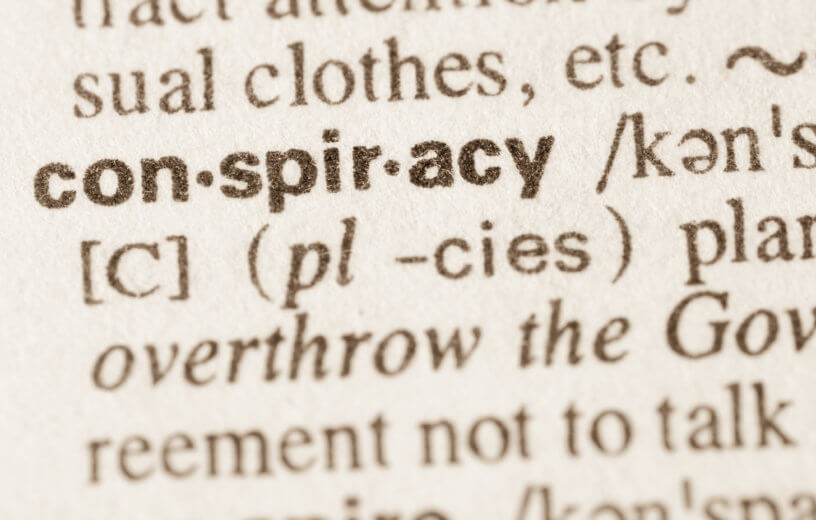COLUMBUS, Ohio – Doubting the severity of the COVID-19 pandemic or generally believing that the entire crisis was a man-made hoax can serve as a “gateway” to believing other conspiracy theories, a new study claims.
Researchers from The Ohio State University say their findings show that people who reported a greater belief in conspiracy theories related to the pandemic were more likely to also think the 2020 presidential election was stolen from Donald Trump through acts of voter fraud.
The researchers add their preliminary evidence suggests that a sense of distrust may act as a trigger. They hypothesize that belief in one conspiracy, prompted by a single event, leads to an increase in conspiratorial thinking over time. Trends in the data also suggest that financial distress during lockdown could have sparked belief in COVID conspiracy theories, even among people who did not think conspiratorially before the virus.
The field of conspiracy theory research is relatively young. To date, it has tended to look for traits that predict a tendency to believe in conspiracy theories at a given point in time.
“If you read interviews or forums frequented by conspiracy theorists, you see a phenomenon where people tend to go down the rabbit hole after something happens in their life that triggers general interest in conspiracy theories,” says first author Javier Granados Samayoa, who completed the work while a graduate student in psychology at Ohio State, in a university release. “With COVID-19, there was this large event that people could not control, so how could they make sense of it? One way is by adhering to conspiracy theories.”
COVID skepticism led to long-term distrust
The research team asked 501 participants in a June 2020 survey to answer questions assessing their beliefs in COVID-19 conspiracy theories, their political ideology, and what is called conspiracist ideation — or someone’s overall endorsement for conspiracy theories.
In this section, participants used a five-point scale ranging from “definitely not true” to “definitely true” to rate statements such as “some UFO sightings and rumors are planned or staged in order to distract the public from real alien contact” and “new and advanced technology which would harm current industry is being suppressed.”
Six months later, in December 2020, researchers asked 107 of those participants to report the extent to which they believed there had been voter fraud in the 2020 election.
Statistical analysis showed that participants who reported a greater belief that the coronavirus was intentionally released for malicious purposes and that the severity of COVID infections was blown out of proportion also reported a greater belief that the 2020 election had been stolen from then-President Trump.
Those same COVID sceptics had more of an affinity for other conspiracy theories than they did in the June survey six months previously, according to the findings published in the journal PLoS ONE.
Does a person’s political beliefs matter?
This was true even after the analysis took into account the association between COVID conspiracy beliefs, voter fraud, and conservative political views — leading the researchers to suggest that belief in one conspiracy theory leads to another.
“It’s speculative, but it appears that once people adopt one conspiracy belief, it promotes distrust in institutions more generally – it could be government, science, the media, whatever,” says senior author Russell Fazio, a professor of psychology at Ohio State. “Once you start viewing events through that distrustful lens, it’s very easy to adopt additional conspiracy theories.”
The team also used data from a large U.K. study conducted in the early spring and late autumn of 2020, which shows that British adults who believe COVID is a hoax are also more likely to believe in other conspiracy theories over time. While some past conspiracy theories have turned out to be true, the researchers say this study focused on beliefs that are not supported by evidence.
They note that a better understanding of the dynamics of conspiratorial thinking could help stop the spread of conspiratorial thinking, which displays a link to a higher risk for violence and discrimination and poorer health choices.
“These findings show that we need to be prepared for any additional large-scale events similar to COVID-19 to stem off conspiracist ideation because once people go down the rabbit hole, they may get stuck,” concludes Granados Samayoa, now a postdoctoral fellow at the University of Pennsylvania.
South West News Service writer Danny Halpin contributed to this report.


Guess Ohio State University has become dumbed down.
One lie lead to distrust and more lies lead to disassociation. The catch phrase conspiracy theory was originally pushed by the US government to hide truth about Vietnam (freedom of information act was enlightening, look it up).. and they demonize those who call out the lie and speak the truth, as crazy. This tactic is used in all things now.. oh, you must be a conspiracy theorist if you don’t trust the constantly changing science of medicine and thermodynamics. You must be a conspiracy theorist if you don’t trust the redacted ingredients in the shots (they wanted it kept from you for 70 years — for your health??). You must be a conspiracy theorist if you believe that voting machines were/are manipulated. All those things happened, but those who distrust because they know, are being demonized by those pushing the lies. It’s pretty disgusting. I walked away from politics and all talking heads because they all lie to the people and blame the people for realizing it.